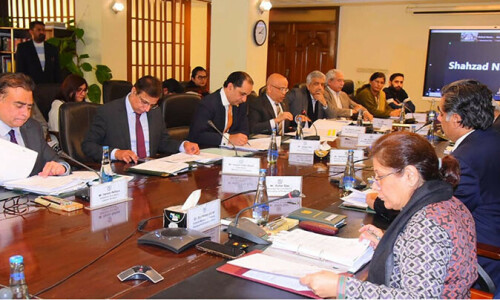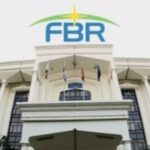ISLAMABAD The caretaker administration approved an additional up to 45% rise in the natural gas tariff on Wednesday, effective from February 1, in order to achieve the income requirements of the gas utilities targeted for the current year, in response to pressure to meet the International Monetary Fund’s (IMF) deadline of February 15.
The decision was made during a meeting of the Cabinet’s Economic Coordination Committee (ECC), which was chaired by Dr. Shamshad Akhtar, the acting finance minister. During the discussion, the Petroleum Division’s suggested rates of rise were modified. These changes were then included in the updated summary, which was presented to the federal cabinet on Friday for official approval and notice.
A statement from the Ministry of Finance following the ECC meeting stated, “After discussion, the ECC determined that the adjustment of sale price/tariff should be in line with revenue demands of the Sui companies.”
The Petroleum Division informed the ECC that, for the current fiscal year, Ogra’s revised estimated revenue requirements stood at Rs592 billion for SNGPL and Rs310 billion for SSGCL. This meant that the overall revenue requirement was Rs902 billion, with an average prescribed price of Rs1,596 per mmBtu.
ECC cuts rise for home protected users and have an influence on industry.
According to well-informed sources, the ECC chose to transfer the burden to other industries and sectors such as fertilizer and industry, and to progressively reduce the anticipated increase for protected domestic customers.
Under a program benchmark agreed upon with the IMF, the government would “seek to decrease large preferential cross-subsidies across industrial and commercial consumers, and further disincentivize captive gas use” in addition to continuing to update end-user gas prices on a regular basis in accordance with revenue and legal requirements. The notification for the Ogra-determined gas price adjustment was to be implemented by February 15th.
As a result, the ECC approved an increase of Rs50 per unit, or over 41%, to Rs170 per mmBtu from the current Rs121 per unit for protected home clients with less than 0.25 hundred cubic meters (hcm) of consumption. For that group, the Petroleum Division has suggested a 65 percent (or Rs. 80 per unit) increase. Other protected consumer slabs with usage less than 0.9 hcm have been granted a similar 40–45 percent increase, and the prices for three categories would now be higher by Rs70–Rs80 per unit rather than the Rs100 per unit that the Petroleum Division had suggested.
For residential clients who are not covered, the hike might be as much as 27 percent, or between Rs 250 and Rs 350 per unit. As a result, instead of paying Rs1,000 per unit, the first slab (1hcm) in this category would now pay Rs1,250.
Instead of the current payment of Rs1,200 per unit, the second slab (1.5hcm) will receive Rs1,550. With a maximum tariff of Rs4,200 per mmBtu for more than 4 hours of continuous use per month, the rates for higher classifications would also increase by Rs300 each unit.
According to the finance ministry, the ECC also suggested standard gas pricing for fertilizer companies and gave the Pakistani Competition Commission instructions to look into and assign blame for the recent, unjustified spike in urea prices. The Ministry of Industries was also instructed by the ECC to guarantee the market’s urea price stability.
Unless the cabinet makes any amendments, the tariffs for special commercial (Roti Tandoor) and bulk household will increase from Rs2,000 to Rs2,900 per mmBtu. Likewise, the special commercial (Roti Tandoor) category will be charged a flat fee of Rs700 per mmBtu. Since 2015, this rate has not changed.
Rates for captive power plants have climbed by roughly 20 percent for both domestic and foreign sectors, while feedstock rates have increased by 30 percent and 11 percent, respectively, for the manufacturing of fertilizer. Soon after the cabinet meeting, the IMF would get the updated rates with notification.
Rationalization of sales tax
The Federal Board of Revenue’s (FBR) proposal for the “Rationalization of Criterion of Enhanced Rate of 25pc Sales Tax on Locally Manufactured/Assembled Vehicles (PCT87.03)” was also accepted by the ECC.
The Ministry of Finance of Pakistan, Karandaz, and the National Credit Guarantee Company Ltd (NCGCL) were also granted “Approval of Share Subscription Agreement (SSA) of NCGCL.”
The Finance Division’s report on the “Approval of Technical Supplementary Grant for Provision of Rupee Cover for Remaining Funds,” which amounts to Rs7.6 billion of the first tranche of $85 million credit lines acquired from the World Bank, was also authorized.
SOURCE: DAWN NEWS








